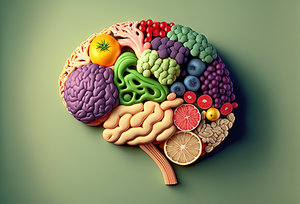Not Enough Nutrients?
Proton-Pump Inhibitors: Impact on Nutrient Absorption and How to Address Deficiencies
By Dr. Jason Strotheide
PPIs are a type of medication that function by targeting and inhibiting the stomach's acid-producing proton pumps, thereby reducing gastric acidity.
This decrease in stomach acid can compromise the absorption of key nutrients, leading to deficiencies that could impact health if left unaddressed. The absorption of essential nutrients like vitamin B
12, magnesium, calcium, and iron is particularly affected due to their reliance on gastric acid for optimal absorption.
Addressing Nutrient Deficiencies
Vitamin B12 Deficiency: Vitamin B12 is vital for neurological function, red blood cell production, and DNA synthesis. Its absorption is significantly impaired by reduced gastric acid, a common side effect of PPI use, potentially leading to anemia, fatigue, and neurological complications.
To counteract this, PPI users are advised to consider B12 supplementation, specifically in forms that are more readily absorbable and thus less dependent on gastric acid for absorption.1
 Magnesium Deficiency: Playing a critical role in muscle and nerve functions, as well as bone health, magnesium deficiency can result from long-term PPI use. Symptoms can range from muscle cramps to seizures and cardiac arrhythmias. Incorporating magnesium-rich foods and supplements into one's diet can help mitigate this risk, ensuring adequate magnesium levels.2
Magnesium Deficiency: Playing a critical role in muscle and nerve functions, as well as bone health, magnesium deficiency can result from long-term PPI use. Symptoms can range from muscle cramps to seizures and cardiac arrhythmias. Incorporating magnesium-rich foods and supplements into one's diet can help mitigate this risk, ensuring adequate magnesium levels.2
Calcium Deficiency: Calcium's absorption is also hindered by reduced stomach acid levels, affecting bone health, muscle function, and nerve transmission. Adequate calcium intake, through dietary sources or supplements, is essential for individuals taking PPIs to prevent potential deficiencies and maintain bone density.1
Iron Deficiency: Iron is essential for oxygen transport and energy production. Reduced gastric acid from PPI usage can impair iron absorption, potentially leading to anemia. Addressing this through dietary adjustments or supplementation is crucial for maintaining adequate iron levels.2
The Importance of Dietary Supplementation With PPI Use
The nutrient deficiencies associated with PPI use highlight the importance of dietary supplementation. B12 supplements generally aim to provide targeted nutritional support for those affected by PPI-related nutrient deficiencies.
PPIs, while beneficial for treating acid-related disorders, necessitate a proactive approach to managing the associated risk of nutrient deficiencies through dietary supplementation. Incorporating supplements can provide essential nutritional support, ensuring the well-being of individuals on long-term PPI therapy. Talk to your doctor for more information.
References
- Lahner E, Annibale B, Delle Fave G. Systematic review: impaired drug absorption related to the co-administration of antisecretory therapy. Alim Pharmacol Ther, 2009;29(12):1219-1229.
- Sheen E, Triadafilopoulos G. Adverse effects of long-term proton pump inhibitor therapy. Dig Dis Sci, 2011;56(4):931-950.
Jason Strotheide, DC, is the founder & CEO of ChiroNutraceutical, creators of the ChiroThin weight-loss program. As the company's flagship product, ChiroThin has achieved remarkable success with nearly 300,000 programs sold across the United States and Canada, making it the #1 weight-loss program exclusively for chiropractic offices. Dr. Strotheide is a 1993 graduate of Logan College of Chiropractic.

